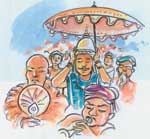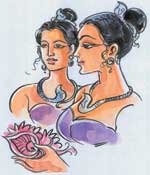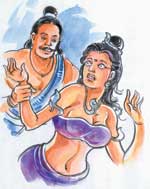|
This article is part of a continuing series on the ‘Mahavamsa’, the recorded chronicle of Sri Lankan history King
Dutugemunu confined to the sick-bed 2. Time passed. King Dutugemunu got involved with the completion of the work on the stupa. The Naga queen made it a point to find out whether the Naga king was hiding by the tank. There was no sign of him there. By this time, the king had forgotten the advice given by the Naga queen and started frequenting the tank once more, for his usual bath. The queen knew it but did not try to stop him from going there. The king took pleasure in his bath at the tank. He even organized water-sports at the tank. The Naga king who got to know all about this was playing for time.
4. Thereupon, the Naga king changed his disguise, left the teacher’s house and went straight to the Tissa tank and hid, awaiting the arrival of the king. The king who was thoroughly ignorant of what was in store for him, came as usual for his bath. He bathed to his heart’s content, came out of the water and bent down to take his clothes and jewels. As he bent down, the Naga king acted and stung the king right on his head. No sooner than this was done, he got back to the kingdom of the Nagas.
6. The king felt that he was becoming weaker by the day. He was not afraid to face death. His one and only concern was to complete the work of the stupa. Only the finishing touches had to be given. Finally, white washing remained to be done. During this period, Prince Tissa was in Digamadulla. The king sent a message asking him to come to Anuradhapura, as soon as he could. As soon as he got the message, the prince came rushing. It is only when he reached the palace, that he got to know that his brother had fallen ill. 7. When Tissa entered the palace, he went straight to see his brother. By then, the king’s condition had worsened. He had become very thin and had changed beyond recognition. Tissa was extremely sad to see his brother so sick. He sat beside the brother and stroked his head. The king was in tears. Tissa too, couldn’t control his tears. They were both quiet for a while. Then in a faint voice, the king began to speak. 8. He addressed his brother and said, “My dear brother, it’s no use lamenting now. We bring forth death along with birth. This is an external truth. No one could change it. I’m now on the threshold of death. I’m not one bit scared of it. I have served my country, my people and my religion to the best of my ability. My only wish now is to complete the work of the ‘Ruwanveli Chetiya’ and worship there. You accept the kingship of the entire country. My wish is to see the completion of the work at the Ruwanveli Chetiya before I die”.
By Halaliye Karunathilake |
||||
Copyright © 2001 Wijeya Newspapers
Ltd. All rights reserved. |
 1.
The Naga King took the guise of an ordinary man and went
in search of the physicians who treated serpent bites. He met an
expert, in this field of medicine, spoke to him nicely, won his
heart and begged of him to teach this science to him. The kind physician
was deceived by the Naga King, who was in the guise of a man. The
physician agreed to teach him and as was the custom, he was to stay
with the physician and follow his studies.
1.
The Naga King took the guise of an ordinary man and went
in search of the physicians who treated serpent bites. He met an
expert, in this field of medicine, spoke to him nicely, won his
heart and begged of him to teach this science to him. The kind physician
was deceived by the Naga King, who was in the guise of a man. The
physician agreed to teach him and as was the custom, he was to stay
with the physician and follow his studies. 3.
Meanwhile, the physician had taught quite a lot to the Naga king.
He proved to be a good student. One day, he asked his teacher, “Sir,
can you give me an instance where, you cannot cure a serpent bite?”
The physician then said if the serpent stings directly on the head
of a man, it’s fatal. No medicine will answer. The Naga king
was thrilled. He had worked hard all these days to learn this.
3.
Meanwhile, the physician had taught quite a lot to the Naga king.
He proved to be a good student. One day, he asked his teacher, “Sir,
can you give me an instance where, you cannot cure a serpent bite?”
The physician then said if the serpent stings directly on the head
of a man, it’s fatal. No medicine will answer. The Naga king
was thrilled. He had worked hard all these days to learn this. 5.
The king became unconscious and fell down. The king’s
men were alarmed. They immediately carried the king to the palace.
All the physicians of the country were brought to the palace. They
examined the king and realized that they could not give a permanent
cure. Yet, they did their best to make the king live a little more.
He was placed in a vessel full of medicine (Beheth-oruwa) and given
all kinds of treatment. The king regained consciousness but remained
a patient for the rest of his life. He had to continue treatment
daily. Gradually the king came to realize that his death was near.
5.
The king became unconscious and fell down. The king’s
men were alarmed. They immediately carried the king to the palace.
All the physicians of the country were brought to the palace. They
examined the king and realized that they could not give a permanent
cure. Yet, they did their best to make the king live a little more.
He was placed in a vessel full of medicine (Beheth-oruwa) and given
all kinds of treatment. The king regained consciousness but remained
a patient for the rest of his life. He had to continue treatment
daily. Gradually the king came to realize that his death was near.